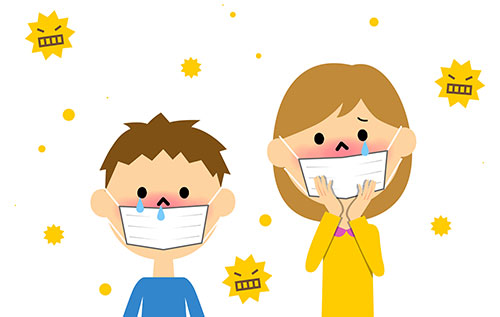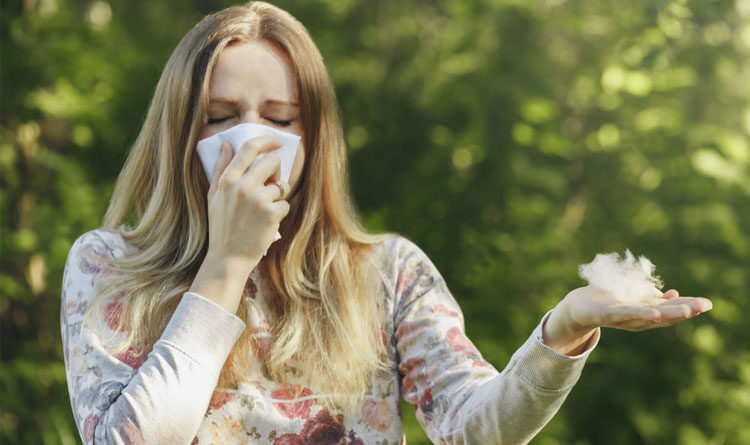Spring brings back the colors in our lives after we have suffered from the darkness and gloominess of the winter season. But along with the wonderful colors of spring also comes the seasonal allergies. As we watch in awe how beautiful the flowers bloom one by one, there are plenty of people who suffer from what they call the hay fever.
What is hay fever?
Hay fever (also called as allergic rhinitis) is a type of allergic disorder that is caused by the response of our immune system to pollen grains along with other substances.
If you are suffering from hay fever, it just means that your body has developed an allergic reaction from pollens emitted by trees, grass, and weeds. But in addition to that, other causes of hay fever include feathers, animal dander, dust mites, and molds.
Related : 9 SPRING HEALTH TIPS TO HELP YOU TUNE INTO THE SEASON

Why is Spring The Cruelest Season for Sufferers?
Many people are excited about spring but for people with hay fever, spring is a season that they dread the most. Why is this so? Well, that’s because spring is when they feel hay fever symptoms the most. Why is this so? Well, one of the reasons would be the pollen count in the environment.
There are two types of hay fever. The first one is perennial or the type of hay fever that occurs whole year round. The second one is called seasonal which takes place at the time of the year when the flowers are beginning to bloom, and the trees and plants pollinate. And can you guess what season it is? Spring, of course!
But despite both summer and spring having the same pollen count, people still feel the symptoms worst during spring. Why is this so? Well, there are some theories. For one, it may be because the pollen from early flowering grass is more allergenic than the late-flowering plants. Second, they also believe that symptoms are a lot mild later in the season because sufferers have already gotten used to their symptoms. Lastly, they believe that the body’s ability to regulate inflammation later in the season has become stronger because it has finally able to produce T cells. Here are the hey fever symptoms and treatment.
Related : TREATMENT FOR SUN DAMAGED SKIN : IT’S NEVER TOO LATE TO CURE IT

Symptoms of Hay Fever
So, how would you know if you are suffering from hay fever? Well, there are lots of hay fever symptoms and treatment to watch out for. Some of the most common symptoms of hay fever that people experience are nasal congestion, runny nose, coughing, sneezing, itchy feeling on nose, throat or at the roof of mouth, fatigue, post nasal drip, allergic shiners (the skin under the eyes is swollen and exhibits a blue color) and allergic conjunctivitis (inflammation of the eyes characterized by itchiness, redness and watery feeling).
If you are suffering from the symptoms that we have mentioned above, then it is best that you consult a doctor or find a way to treat hay fever.
Related : 5 STEPS ON HOW TO OVERCOME PANIC ATTACKS WHEN YOU FEEL IT’S COMING

How To Treat Hay Fever?
There are plenty of ways on how to treat hay fever symptoms. If you wish to know how you can manage the annoying symptoms of this condition, here are some of the tips that you should know about:
Home Remedies
Since it is just an allergic condition, many people think that it will not always require a medical treatment so they opt for a home remedy that can help manage the symptoms instead. Some of the most common home remedies for hay fever include gargling with warm salt water (2 tablespoons of salt in 8 ounces of water) and drinking herbal teas (green tea, ginger tea, chamomile tea, peppermint tea and butterbur).
There are also some old-time folk home remedies that still work well for hay fever up to now. One of these is steaming wherein you will add a few drops of eucalyptus oil in hot water and very carefully inhale its steam. For soothing itchy eyes, you can try washing your eyes with diluted Calendula liquid. Lastly, taking omega three fatty acid supplements can reduce the amount of inflammatory chemicals that the body has produced in response to pollen exposure.
Medications
There are also plenty of over-the-counter medicines that you can take to address hay fever.
For one, antihistamines (like cetirizine, loratadine, and fexofenadine) are known to stop certain symptoms of hay fever like watery eyes, sneezing, and itching. These types of medications can also be used as a preventative treatment for hay fever.
If your primary concern is your blocked nose or if you are pregnant, the best medication for you would be corticosteroid nasal drops and sprays. To make the most out of this medication, it is recommended that you use them as soon and as consistent as possible.
Lastly, eye drops are recommended if you are bothered with allergic conjunctivitis. The best type of eye drop to use is one that contains sodium cromoglicate.
Yes, we would love to welcome spring with open arms, but hay fever is one of the biggest health problems that come with it. Lucky for you, we have already provided all the information you need to know to understand and treat this dreaded allergy. Keep in mind everything that we have mentioned above, and you can survive the worst hay fever season of all time– unscathed!







